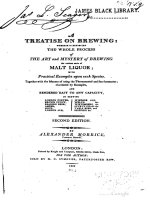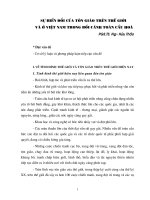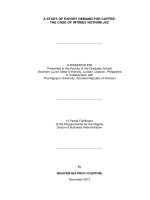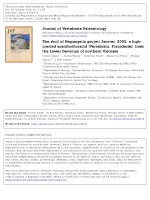Carolyn keene mildred a wirt NANCY DREW MYSTERY STORIES 02 the hidden staircase (v5 0)
Bạn đang xem bản rút gọn của tài liệu. Xem và tải ngay bản đầy đủ của tài liệu tại đây (2.61 MB, 104 trang )
Table of Contents
Title Page
Copyright Page
CHAPTER I - The Haunted House
CHAPTER II - The Mysterious Mishap
CHAPTER III - A Stolen Necklace
CHAPTER IV - Strange Music
CHAPTER V - A Puzzling Interview
CHAPTER VI - The Gorilla Face
CHAPTER VII - Frightening Eyes
CHAPTER VIII - A Startling Plunge
CHAPTER IX - A Worrisome Delay
CHAPTER X - The Midnight Watch
CHAPTER XI - An Elusive Ghost
CHAPTER XII - The Newspaper Clue
CHAPTER XIII - The Crash
CHAPTER XIV - An Urgent Message
CHAPTER XV - A New Suspect
CHAPTER XVI - Sold!
CHAPTER XVII - Through the Trap Door
CHAPTER XVIII - A Confession
CHAPTER XIX - The Hidden Staircase
CHAPTER XX - Nancy’s Victory
Both girls froze in their tracks
PRINTED ON RECYCLED PAPER
Copyright © 1987, 1959, 1930 by Simon & Schuster, Inc. All rights reserved.
Published by Grosset & Dunlap, Inc., a member of The Putnam &
Grosset Group, New York. Published simultaneously in Canada. .S.A.
NANCY DREW MYSTERY STORIES® is a registered trademark of Simon & Schuster, Inc.
GROSSET & DUNLAP is a trademark of Grosset & Dunlap, Inc.
eISBN : 978-1-440-67365-8
2007 Printing
CHAPTER I
The Haunted House
NANCY DREW began peeling off her garden gloves as she ran up the porch steps and into the hall to
answer the ringing telephone. She picked it up and said, “Hellol”
“Hi, Nancy! This is Helen.” Although Helen Corning was nearly three years older than Nancy, the
two girls were close friends.
“Are you tied up on a case?” Helen asked.
“No. What’s up? A mystery?”
“Yes—a haunted house.”
Nancy sat down on the chair by the telephone. “Tell me more!” the eighteen-year-old detective
begged excitedly.
“You’ve heard me speak of my Aunt Rosemary,” Helen began. “Since becoming a widow, she has
lived with her mother at Twin Elms, the old family mansion out in Cliffwood. Well, I went to see
them yesterday. They said that many strange, mysterious things have been happening there recently. I
told them how good you are at solving mysteries, and they’d like you to come out to Twin Elms and
help them.” Helen paused, out of breath.
“It certainly sounds intriguing,” Nancy replied, her eyes dancing.
“If you’re not busy, Aunt Rosemary and I would like to come over in about an hour and talk to you
about the ghost.”
“I can’t wait.”
After Nancy had put down the phone, she sat lost in thought for several minutes. Since solving The
Secret of the Old Clock, she had longed for another case. Here was her chancel
Attractive, blond-haired Nancy was brought out of her daydreaming by the sound of the doorbell.
At the same moment the Drews’ housekeeper, Hannah Gruen, came down the front stairs,
“I’ll answer it,” she offered.
Mrs. Gruen had lived with the Drews since Nancy was three years old. At that time Mrs. Drew had
passed away and Hannah had become like a second mother to Nancy. There was a deep affection
between the two, and Nancy confided all her secrets to the understanding housekeeper.
Mrs. Gruen opened the door and instantly a man stepped into the hall. He was short, thin, and rather
stooped. Nancy guessed his age to be about forty.
“Is Mr. Drew at home?” he asked brusquely. “My name is Gomber—Nathan Gomber.”
“No, he’s not here just now,” the housekeeper replied.
The caller looked over Hannah Gruen’s shoulder and stared at Nancy. “Are you Nancy Drew?”
“Yes, I am. Is there anything I can do for you?”
The man’s shifty gaze moved from Nancy to Hannah. “I’ve come out of the goodness of my heart to
warn you and your father,” he said pompously.
“Warn us? About what?” Nancy asked quickly.
Nathan Gomber straightened up importantly and said, “Your father is in great danger, Miss Drew!”
Both Nancy and Hannah Gruen gasped. “You mean this very minute?” the housekeeper questioned.
“All the time,” was the startling answer. “I understand you’re a pretty bright girl, Miss Drew —that
you even solve mysteries. Well, right now I advise you to stick close to your father. Don’t leave him
for a minute.”
Hannah Gruen looked as if she were ready to collapse and suggested that they all go into the living
room, sit down, and talk the matter over. When they were seated, Nancy asked Nathan Gomber to
explain further.
“The story in a nutshell is this,” he began. “You know that your father was brought in to do legal
work for the railroad when it was buying property for the new bridge here.”
As Nancy nodded, he continued, “Well, a lot of the folks who sold their property think they were
gypped.”
Nancy’s face reddened. “I understood from my father that everyone was well paid.”
“That’s not true,” said Gomber. “Besides, the railroad is in a real mess now. One of the property
owners, whose deed and signature they claim to have, says that he never signed the contract of sale.”
“What’s his name?” Nancy asked.
“Willie Wharton.”
Nancy had not heard her father mention this name. She asked Gomber to go on with his story.
“I’m acting as agent for Willie Wharton and several of the land owners who were his neighbors,”
he said, “and they can make it pretty tough for the railroad. Willie Wharton’s signature was never
witnessed and the attached certificate of acknowledgment was not notarized. That’s good proof the
signature was a forgery. Well, if the railroad thinks they’re going to get away with this, they’re not!”
Nancy frowned. Such a procedure on the part of the property owners meant trouble for her father!
She said evenly, “But all Willie Wharton has to do is swear before a notary that he did sign the
contract of sale.”
Gomber chuckled. “It’s not that easy, Miss Drew. Willie Wharton is not available. Some of us
have a good idea where he is and we’ll produce him at the right time. But that time won’t be until the
railroad promises to give the sellers more money. Then he’ll sign. You see, Willie is a real kind man
and he wants to help his friends out whenever he can. Now he’s got a chance.”
Nancy had taken an instant dislike to Gomber and now it was quadrupled. She judged him to be the
kind of person who stays within the boundaries of the law but whose ethics are questionable. This
was indeed a tough problem for Mr. Drew!
“Who are the people who are apt to harm my father?” she asked.
“I’m not saying who they are,” Nathan Gomber retorted. “You don’t seem very appreciative of my
coming here to warn you. Fine kind of a daughter you are. You don’t care what happens to your
father!”
Annoyed by the man’s insolence, both Nancy and Mrs. Gruen angrily stood up. The housekeeper,
pointing toward the front door, said, “Good day, Mr. Gomber!”
The caller shrugged as he too arose. “Have it your own way, but don’t say I didn’t warn you!”
He walked to the front door, opened it, and as he went outside, closed it with a tremendous bang.
“Well, of all the insulting people!” Hannah snorted.
Nancy nodded. “But that’s not the worst of it, Hannah darling. I think there’s more to Gomber’s
warning than he is telling. It seems to me to imply a threat. And he almost has me convinced. Maybe I
should stay close to Dad until he and the other lawyers have straightened out this railroad tangle.”
She said this would mean giving up a case she had been asked to take. Hastily Nancy gave Hannah
the highlights of her conversation with Helen about the haunted mansion. “Helen and her aunt will be
here in a little while to tell us the whole story.”
“Oh, maybe things aren’t so serious for your father as that horrible man made out,” Hannah said
encouragingly. “If I were you I’d listen to the details about the haunted house and then decide what
you want to do about the mystery.”
In a short time a sports car pulled into the winding, tree-shaded driveway of the Drew home. The
large brick house was set some distance back from the street.
Helen was at the wheel and stopped just beyond the front entrance. She helped her aunt from the
car and they came up the steps together. Mrs. Rosemary Hayes was tall and slender and had graying
hair. Her face had a gentle expression but she looked tired.
Helen introduced her aunt to Nancy and to Hannah, and the group went into the living room to sit
down. Hannah offered to prepare tea and left the room.
“Oh, Nancy,” said Helen, “I do hope you can take Aunt Rosemary and Miss Flora’s case.” Quickly
she explained that Miss Flora was her aunt’s mother. “Aunt Rosemary is really my great-aunt and
Miss Flora is my great-grandmother. From the time she was a little girl everybody has called her
Miss Flora.”
“The name may seem odd to people the first time they hear it,” Mrs. Hayes remarked, “but we’re
all so used to it, we never think anything about it.”
“Please tell me more about your house,” Nancy requested, smiling.
“Mother and I are almost nervous wrecks,” Mrs. Hayes replied. “I have urged her to leave Twin
Elms, but she won’t. You see, Mother has lived there ever since she married my father, Everett
Turnbull.”
Mrs. Hayes went on to say that all kinds of strange happenings had occurred during the past couple
of weeks. They had heard untraceable music, thumps and creaking noises at night, and had seen eerie,
indescribable shadows on walls.
“Have you notified the police?” Nancy asked.
“Oh, yes,” Mrs. Hayes answered. “But after talking with my mother, they came to the conclusion
that most of what she saw and heard could be explained by natural causes. The rest, they said,
probably was imagination on her part. You see, she’s over eighty years old, and while I know her
mind is sound and alert, I’m afraid that the police don’t think so.”
After a pause Mrs. Hayes went on, “I had almost talked myself into thinking the ghostly noises
could be attributed to natural causes, when something else happened.”
“What was that?” Nancy questioned eagerly.
“We were robbed! During the night several pieces of old jewelry were taken. I did telephone the
police about this and they came to the house for a description of the pieces. But they still would not
admit that a ‘ghost’ visitor had taken them.”
Nancy was thoughtful for several seconds before making a comment. Then she said, “Do the police
have any idea who the thief might be?”
Aunt Rosemary shook her head. “No. And I’m afraid we might have more burglaries.”
Many ideas were running through Nancy’s head. One was that the thief apparently had no intention
of harming anyone—that his only motive had been burglary. Was he or was he not the person who
was “haunting” the house? Or could the strange happenings have some natural explanations, as the
police had suggested?
At this moment Hannah returned with a large silver tray on which was a tea service and some
dainty sandwiches. She set the tray on a table and asked Nancy to pour the tea. She herself passed the
cups of tea and sandwiches to the callers.
As they ate, Helen said, “Aunt Rosemary hasn’t told you half the things that have happened. Once
Miss Flora thought she saw someone sliding out of a fireplace at midnight, and another time a chair
moved from one side of the room to the other while her back was turned. But no one was there!”
“How extraordinary!” Hannah Gruen exclaimed. “I’ve often read about such things, but I never
thought I’d meet anyone who lived in a haunted house.”
Helen turned to Nancy and gazed pleadingly at her friend. “You see how much you’re needed at
Twin Elms? Won’t you please go out there with me and solve the mystery of the ghost?”
CHAPTER II
The Mysterious Mishap
SIPPING their tea, Helen Corning and her aunt waited for Nancy’s decision. The young sleuth was in
a dilemma. She wanted to start at once solving the mystery of the “ghost” of Twin Elms. But Nathan
Gomber’s warning still rang in her ears and she felt that her first duty was to stay with her father.
At last she spoke. “Mrs. Hayes—” she began.
“Please call me Aunt Rosemary,” the caller requested. “All Helen’s friends do.”
Nancy smiled. “I’d love to. Aunt Rosemary, may I please let you know tonight or tomorrow? I
really must speak to my father about the case. And something else came up just this afternoon which
may keep me at home for a while at least.”
“I understand,” Mrs. Hayes answered, trying to conceal her disappointment.
Helen Corning did not take Nancy’s announcement so calmly. “Oh, Nancy, you just must come. I’m
sure your dad would want you to help us. Can’t you postpone the other thing until you get back?”
“I’m afraid not,” said Nancy. “I can’t tell you all the details, but Dad has been threatened and I feel
that I ought to stay close to him.”
Hannah Gruen added her fears. “Goodness only knows what they may do to Mr. Drew,” she said.
“Somebody could come up and hit him on the head, or poison his food in a restaurant, or—”
Helen and her aunt gasped. “It’s that bad?” Helen asked, her eyes growing wide.
Nancy explained that she would talk to her father when he returned home. “I hate to disappoint
you,” she said, “but you can see what a quandary I’m in.”
“You poor girll” said Mrs. Hayes sympathetically. “Now don’t you worry about us.”
Nancy smiled. “I’ll worry whether I come or not,” she said. “Anyway, I’ll talk to my dad tonight.”
The callers left shortly. When the door had closed behind them, Hannah put an arm around Nancy’s
shoulders. “I’m sure everything will come out all right for everybody,” she said. “I’m sorry I talked
about those dreadful things that might happen to your father. I let my imagination run away with me,
just like they say Miss Flora’s does with her.”
“You’re a great comfort, Hannah dear,” said Nancy. “To tell the truth, I have thought of all kinds of
horrible things myself.” She began to pace the floor. “I wish Dad would get home.”
During the next hour she went to the window at least a dozen times, hoping to see her father’s car
coming up the street. It was not until six o’clock that she heard the crunch of wheels on the driveway
and saw Mr. Drew’s sedan pull into the garage.
“He’s safe!” she cried out to Hannah, who was testing potatoes that were baking in the oven.
In a flash Nancy was out the back door and running to meet her father. “Oh, Dad, I’m so glad to see
you!” she exclaimed.
She gave him a tremendous hug and a resounding kiss. He responded affectionately, but gave a
little chuckle. “What have I done to rate this extra bit of attention?” he teased. With a wink he added,
“I know. Your date for tonight is off and you want me to substitute.”
“Oh, Dad,” Nancy replied. “Of course my date’s not off. But I’m just about to call it off.”
“Why?” Mr. Drew questioned. “Isn’t Dirk going to stay on your list?”
“It’s not that,” Nancy replied. “It’s because—because you’re in terrible danger, Dad. I’ve been
warned not to leave you.”
Instead of looking alarmed, the lawyer burst out laughing. “In terrible danger of what? Are you
going to make a raid on my wallet?”
“Dad, be serious! I really mean what I’m saying. Nathan Gomber was here and told me that you’re
in great danger and I’d better stay with you at all times.”
The lawyer sobered at once. “That pest again!” he exclaimed. “There are times when I’d like to
thrash the man till he begged for mercy!”
Mr. Drew suggested that they postpone their discussion about Nathan Gomber until dinner was
over. Then he would tell his daughter the true facts in the case. After they had finished dinner, Hannah
insisted upon tidying up alone while father and daughter talked.
“I will admit that there is a bit of a muddle about the railroad bridge,” Mr. Drew began. “What
happened was that the lawyer who went to get Willie Wharton’s signature was very ill at the time.
Unfortunately, he failed to have the signature witnessed or have the attached certificate of
acknowledgment executed. The poor man passed away a few hours later.”
“And the other railroad lawyers failed to notice that the signature hadn’t been witnessed or the
certificate notarized?” Nancy asked.
“Not right away. The matter did not come to light until the man’s widow turned his brief case over
to the railroad. The old deed to Wharton’s property was there, so the lawyers assumed that the
signature on the contract was genuine. The contract for the railroad bridge was awarded and work
began. Suddenly Nathan Gomber appeared, saying he represented Willie Wharton and others who had
owned property which the railroad had bought on either side of the Muskoka River.”
“I understood from Mr. Gomber,” said Nancy, “that Willie Wharton is trying to get more money for
his neighbors by holding out for a higher price himself.”
“That’s the story. Personally, I think it’s a sharp deal on Gomber’s part. The more people he can
get money for, the higher his commission,” Mr. Drew stated.
“What a mess!” Nancy exclaimed. “And what can be done?”
“To tell the truth, there is little anyone can do until Willie Wharton is found. Gomber knows this, of
course, and has probably advised Wharton to stay in hiding until the railroad agrees to give
everybody more money.”
Nancy had been watching her father intently. Now she saw an expression of eagerness come over
his face. He leaned forward in his chair and said, “But I think I’m about to outwit Mr. Nathan
Gomber. I’ve had a tip that Willie Wharton is in Chicago and I’m leaving Monday morning to find
out.”
Mr. Drew went on, “I believe that Wharton will say he did sign the contract of sale which the
railroad company has and will readily consent to having the certificate of acknowledgment notarized.
Then, of course, the railroad won’t pay him or any of the other property owners another cent.”
“But, Dad, you still haven’t convinced me you’re not in danger,” Nancy reminded him.
“Nancy dear,” her father replied, “I feel that I am not in danger. Gomber is nothing but a blowhard. I doubt that he or Willie Wharton or any of the other property owners would resort to violence
to keep me from working on this case. He’s just trying to scare me into persuading the railroad to
accede to his demands.”
Nancy looked skeptical. “But don’t forget that you’re about to go to Chicago and produce the very
man Gomber and those property owners don’t want around here just now.”
“I know.” Mr. Drew nodded. “But I still doubt if anyone would use force to keep me from going.”
Laughingly the lawyer added, “So I won’t need you as a bodyguard, Nancy.”
His daughter gave a sigh of resignation. “All right, Dad, you know best.” She then proceeded to tell
her father about the Twin Elms mystery, which she had been asked to solve. “If you approve,” Nancy
said in conclusion, “I’d like to go over there with Helen.”
Mr. Drew had listened with great interest. Now, after a few moments of thought, he smiled. “Go by
all means, Nancy. I realize you’ve been itching to work on a new case—and this sounds like a real
challenge. But please be careful.”
“Oh, I will, Dad!” Nancy promised, her face lighting up. “Thanks a million.” She jumped from her
chair, gave her father a kiss, then went to phone Helen the good news. It was arranged that the girls
would go to Twin Elms on Monday morning.
Nancy returned to the living room, eager to discuss the mystery further. Her father, however,
glanced at his wrist watch. “Say, young lady, you’d better go dress for that date of yours.” He winked.
“I happen to know that Dirk doesn’t like to be kept waiting.”
“Especially by any of my mysteries.” She laughed and hurried upstairs to change into a dance
dress.
Half an hour later Dirk Jackson arrived. Nancy and the red-haired, former high-school tennis
champion drove off to pick up another couple and attend an amateur play and dance given by the local
Little Theater group.
Nancy thoroughly enjoyed herself and was sorry when the affair ended. With the promise of
another date as soon as she returned from Twin Elms, Nancy said good night and waved from her
doorway to the departing boy. As she prepared for bed, she thought of the play, the excellent
orchestra, how lucky she was to have Dirk for a date, and what fun it had all been. But then her
thoughts turned to Helen Corning and her relatives in the haunted house, Twin Elms.
“I can hardly wait for Monday to come,” she murmured to herself as she fell asleep.
The following morning she and her father attended church together. Hannah said she was going to a
special service that afternoon and therefore would stay at home during the morning.
“I’ll have a good dinner waiting for you,” she announced, as the Drews left.
After the service was over, Mr. Drew said he would like to drive down to the waterfront and see
what progress had been made on the new bridge. “The railroad is going ahead with construction on
the far side of the river,” he told Nancy.
“Is the Wharton property on this side?” Nancy asked.
“Yes. And I must get to the truth of this mixed-up situation, so that work can be started on this side
too.”
Mr. Drew wound among the many streets leading down to the Muskoka River, then took the
vehicular bridge across. He turned toward the construction area and presently parked his car. As he
and Nancy stepped from the sedan, he looked ruefully at her pumps.
“It’s going to be rough walking down to the waterfront,” he said. “Perhaps you had better wait
here.”
“Oh, I’ll be all right,” Nancy assured him. “I’d like to see what’s being done.”
Various pieces of large machinery stood about on the high ground—a crane, a derrick, and
hydraulic shovels. As the Drews walked toward the river, they passed a large truck. It faced the river
and stood at the top of an incline just above two of the four enormous concrete piers which had
already been built.
“I suppose there will be matching piers on the opposite side,” Nancy mused, as she and her father
reached the riverbank. They paused in the space between the two huge abutments. Mr. Drew glanced
from side to side as if he had heard something. Suddenly Nancy detected a noise behind them.
Turning, she was horrified to see that the big truck was moving toward them. No one was at the
wheel and the great vehicle was gathering speed at every moment.
“Dad!” she screamed.
In the brief second of warning, the truck almost seemed to leap toward the water. Nancy and her
father, hemmed in by the concrete piers, had no way to escape being run down.
“Dive!” Mr. Drew ordered.
Without hesitation, he and Nancy made running flat dives into the water, and with arms flailing and
legs kicking, swam furiously out of harm’s way.
The truck thundered into the water and sank immediately up to the cab. The Drews turned and came
back to the shore.
The truck seemed to leap toward them
“Whew! That was a narrow escape!” the lawyer exclaimed, as he helped his daughter retrieve her
pumps which had come off in the oozy bank. “And what sights we are!” Nancy remarked.
“Indeed we are,” her father agreed, as they trudged up the incline. “I’d like to get hold of the
workman who was careless enough to leave that heavy truck on the slope without the brake on
properly.”
Nancy was not so sure that the near accident was the fault of a careless workman. Nathan Gomber
had warned her that Mr. Drew’s life was in danger. The threat might already have been put into
action!
CHAPTER III
A Stolen Necklace
“WE’D better get home in a hurry and change our clothes,” said Mr. Drew. “And I’ll call the
contracting company to tell them what happened.”
“And notify the police?” Nancy suggested.
She dropped behind her father and gazed over the surrounding ground for telltale footprints.
Presently she saw several at the edge of the spot where the truck had stood.
“Dad!” the young sleuth called out. “I may have found a clue to explain how that truck started
downhill.”
Her father came back and looked at the footprints. They definitely had not been made by a
workman’s boots.
“You may think me an old worrier, Dad,” Nancy spoke up, “but these footprints, made by a man’s
business shoes, convince me that somebody deliberately tried to injure us with that truck.”
The lawyer stared at his daughter. Then he looked down at the ground. From the size of the shoe
and the length of the stride one could easily perceive that the wearer of the shoes was not tall. Nancy
asked her father if he thought one of the workmen on the project could be responsible.
“I just can’t believe anyone associated with the contracting company would want to injure us,” Mr.
Drew said.
Nancy reminded her father of Nathan Gomber’s warning. “It might be one of the property owners,
or even Willie Wharton himself.”
“Wharton is short and has a small foot,” the lawyer conceded. “And I must admit that these look
like fresh footprints. As a matter of fact, they show that whoever was here ran off in a hurry. He may
have released the brake on the truck, then jumped out and run away.”
“Yes,” said Nancy. “And that means the attack was deliberate.”
Mr. Drew did not reply. He continued walking up the hill, lost in thought. Nancy followed and they
climbed into the car. They drove home in silence, each puzzling over the strange incident of the
runaway truck. Upon reaching the house, they were greeted by a loud exclamation of astonishment.
“My goodness!” Hannah Gruen cried out. “Whatever in the world happened to you?”
They explained hastily, then hurried upstairs to bathe and change into dry clothes. By the time they
reached the first floor again, Hannah had placed sherbet glasses filled with orange and grapefruit
slices on the table. All during the delicious dinner of spring lamb, rice and mushrooms, fresh peas
and chocolate angel cake with vanilla ice cream, the conversation revolved around the railroad
bridge mystery and then the haunted Twin Elms mansion.
“I knew things wouldn’t be quiet around here for long,” Hannah Gruen remarked with a smile.
“Tomorrow you’ll both be off on big adventures. I certainly wish you both success.”
“Thank you, Hannah,” said Nancy. She laughed. “I’d better get a good night’s sleep. From now on I
may be kept awake by ghosts and strange noises.”
“I’m a little uneasy about your going to Twin Elms,” the housekeeper told her. “Please promise me
that you’ll be careful.”
“Of course,” Nancy replied. Turning to her father, she said, “Pretend I’ve said the same thing to
you about being careful.”
The lawyer chuckled and pounded his chest. “You know me. I can be pretty tough when the need
arises.”
Early the next morning Nancy drove her father to the airport in her blue convertible. Just before she
kissed him good-by at the turnstile, he said, “I expect to return on Wednesday, Nancy. Suppose I stop
off at Cliffwood and see how you’re making out?”
“Wonderful, Dad! I’ll be looking for you.”
As soon as her father left, Nancy drove directly to Helen Corning’s home. The pretty, brunette girl
came from the front door of the white cottage, swinging a suitcase. She tossed it into the rear of
Nancy’s convertible and climbed in.
“I ought to be scared,” said Helen. “Goodness only knows what’s ahead of us. But right now I’m so
happy nothing could upset me.”
“What happened?” Nancy asked as she started the car. “Did you inherit a million?”
“Something better than that,” Helen replied. “Nancy, I want to tell you a big, big secret. I’m going
to be married!”
Nancy slowed the car and pulled to the side of the street. Leaning over to hug her friend, she said,
“Why, Helen, how wonderful! Who is he? And tell me all about it. This is rather sudden, isn’t it?”
“Yes, it is,” Helen confessed. “His name is Jim Archer and he’s simply out of this world. I’m a
pretty lucky girl. I met him a couple of months ago when he was home on a short vacation. He works
for the Tristam Oil Company and has spent two years abroad. Jim will be away a while longer, and
then be given a position here in the States.”
As Nancy started the car up once more, her eyes twinkled. “Helen Corning, have you been engaged
for two months and didn’t tell me?”
Helen shook her head. “Jim and I have been corresponding ever since he left. Last night he
telephoned from overseas and asked me to marry him.” Helen giggled. “I said yes in a big hurry. Then
he asked to speak to Dad. My father gave his consent but insisted that our engagement not be
announced until Jim’s return to this country.”
The two girls discussed all sorts of delightful plans for Helen’s wedding and before they knew it
they had reached the town of Cliffwood.
“My great-grandmother’s estate is about two miles out of town,” Helen said. “Go down Main
Street and turn right at the fork.”
Ten minutes later she pointed out Twin Elms, From the road one could see little of the house. A
high stone wall ran along the front of the estate and beyond it were many tall trees. Nancy turned into
the driveway which twisted and wound among elms, oaks, and maples.
Presently the old Colonial home came into view. Helen said it had been built in 1785 and had been
given its name because of the two elm trees which stood at opposite ends of the long building. They
had grown to be giants and their foliage was beautiful. The mansion was of red brick and nearly all
the walls were covered with ivy. There was a ten-foot porch with tall white pillars at the huge front
door.
“It’s charming!” Nancy commented as she pulled up to the porch.
“Wait until you see the grounds,” said Helen. “There are several old, old buildings. An ice-house,
a smokehouse, a kitchen, and servants’ cottages.”
“The mansion certainly doesn’t look spooky from the outside,” Nancy commented.
At that moment the great door opened and Aunt Rosemary came outside. “Hello, girls,” she greeted
them. “I’m so glad to see you.”
Nancy felt the warmness of the welcome but thought that it was tinged with worry. She wondered if
another “ghost” incident had taken place at the mansion.
The girls took their suitcases from the car and followed Mrs. Hayes inside. Although the
furnishings looked rather worn, they were still very beautiful. The high-ceilinged rooms opened off a
center hall and in a quick glance Nancy saw lovely damask draperies, satin-covered sofas and chairs,
and on the walls, family portraits in large gilt frames of scrollwork design.
Aunt Rosemary went to the foot of the shabbily carpeted stairway, took hold of the handsome
mahogany balustrade, and called, “Mother, the girls are here!”
In a moment a slender, frail-looking woman with snow-white hair started to descend the steps. Her
face, though older in appearance than Rosemary’s, had the same gentle smile. As Miss Flora reached
the foot of the stairs, she held out her hands to both girls.
At once Helen said, “I’d like to present Nancy Drew, Miss Flora.”
“I’m so glad you could come, my dear,” the elderly woman said. “I know that you’re going to solve
this mystery which has been bothering Rosemary and me. I’m sorry not to be able to entertain you
more auspiciously, but a haunted house hardly lends itself to gaiety.”
The dainty, yet stately, Miss Flora swept toward a room which she referred to as the parlor. It was
opposite the library. She sat down in a high-backed chair and asked everyone else to be seated.
“Mother,” said Aunt Rosemary, “we don’t have to be so formal with Nancy and Helen. I’m sure
they’ll understand that we’ve just been badly frightened.” She turned toward the girls. “Something
happened a little while ago that has made us very jittery.”
“Yes,” Miss Flora said. “A pearl necklace of mine was stolen!”
“You don’t mean the lovely one that has been in the family so many years!” Helen cried out.
The two women nodded. Then Miss Flora said, “Oh, I probably was very foolish. It’s my own
fault. While I was in my room, I took the necklace from the hiding place where I usually keep it. The
catch had not worked well the last time I wore the pearls and I wanted to examine it. While I was
doing this, Rosemary called to me to come downstairs. The gardener was here and wanted to talk
about some work. I put the necklace in my dresser drawer. When I returned ten minutes later the
necklace wasn’t there!”
“How dreadful!” said Nancy sympathetically. “Had anybody come into the house during that time?”
“Not to our knowledge,” Aunt Rosemary replied. “Ever since we’ve had this ghost visiting us
we’ve kept every door and window on the first floor locked all the time.”
Nancy asked if the two women had gone out into the garden to speak to their helper. “Mother did,”
said Mrs. Hayes. “But I was in the kitchen the entire time. If anyone came in the back door, I certainly
would have seen the person.”
“Is there a back stairway to the second floor?” Nancy asked.
“Yes,” Miss Flora answered. “But there are doors at both top and bottom and we keep them
locked. No one could have gone up that way.”
“Then anyone who came into the house had to go up by way of the front stairs?”
“Yes.” Aunt Rosemary smiled a little. “But if anyone had, I would have noticed. You probably
heard how those stairs creak when Mother came down. This can be avoided if you hug the wall, but
practically no one knows that.”
“May I go upstairs and look around?” Nancy questioned.
“Of course, dear. And I’ll show you and Helen to your room,” Aunt Rosemary said.
The girls picked up their suitcases and followed the two women up the stairs. Nancy and Helen
were given a large, quaint room at the front of the old house over the library. They quickly deposited
their luggage, then Miss Flora led the way across the hall to her room, which was directly above the
parlor. It was large and very attractive with its canopied mahogany bed and an old-fashioned
candlewick spread. The dresser, dressing table, and chairs also were mahogany. Long chintz
draperies hung at the windows.
An eerie feeling began to take possession of Nancy. She could almost feel the presence of a ghostly
burglar on the premises. Though she tried to shake off the mood, it persisted. Finally she told herself
that it was possible the thief was still around. If so, he must be hiding.
Against one wall stood a large walnut wardrobe. Helen saw Nancy gazing at it intently. She went
over and whispered, “Do you think there might be someone inside?”
“Who knows?” Nancy replied in a low voice. “Let’s find out!”
She walked across the room, and taking hold of the two knobs on the double doors, opened them
wide.
CHAPTER IV
Strange Music
THE ANXIOUS group stared inside the wardrobe. No one stood there. Dresses, suits, and coats hung
in an orderly row.
Nancy took a step forward and began separating them. Someone, she thought, might be hiding
behind the clothes. The others in the room held their breaths as she made a thorough search.
“No one here!” she finally announced, and a sigh of relief escaped the lips of Miss Flora and Aunt
Rosemary.
The young sleuth said she would like to make a thorough inspection of all possible hiding places on
the second floor. With Helen helping her, they went from room to room, opening wardrobe doors and
looking under beds. They did not find the thief.
Nancy suggested that Miss Flora and Aunt Rosemary report the theft to the police, but the older
woman shook her head. Mrs. Hayes, although she agreed this might be wise, added softly, “Mother
just might be mistaken. She’s a little forgetful at times about where she puts things.”
With this possibility in mind, she and the girls looked in every drawer in the room, under the
mattress and pillows, and even in the pockets of Miss Flora’s clothes. The pearl necklace was not
found. Nancy suggested that she and Helen try to find out how the thief had made his entrance.
Helen led the way outdoors. At once Nancy began to look for footprints. No tracks were visible on
the front or back porches, or on any of the walks, which were made of finely crushed stone.
“We’ll look in the soft earth beneath the windows,” Nancy said. “Maybe the thief climbed in.”
“But Aunt Rosemary said all the windows on the first floor are kept locked,” Helen objected.
“No doubt,” Nancy said. “But I think we should look for footprints just the same.”
The girls went from window to window, but there were no footprints beneath any. Finally Nancy
stopped and looked thoughtfully at the ivy on the walls.
“Do you think the thief climbed up to the second floor that way?” Helen asked “her. ”But there’d
still be footprints on the ground.”
Nancy said that the thief could have carried a plank with him, laid it down, and stepped from the
walk to the wall of the house. “Then he could have climbed up the ivy and down again, and gotten
back to the walk without leaving any footprints.”
Once more Nancy went around the entire house, examining every bit of ivy which wound up from
the foundation. Finally she said, “No, the thief didn’t get into the house this way.”
“Well, he certainly didn’t fly in,” said Helen. “So how did he enter?”
Nancy laughed. “If I could tell you that I’d have the mystery half solved.”
She said that she would like to look around the grounds of Twin Elms. “It may give us a clue as to
how the thief got into the house.”
As they strolled along, Nancy kept a sharp lookout but saw nothing suspicious. At last they came to
a half-crumbled brick walk laid out in an interesting crisscross pattern.
“Where does this walk lead?” Nancy asked.
“Well, I guess originally it went over to Riverview Manor, the next property,” Helen replied. “I’ll
show you that mansion later. The first owner was a brother of the man who built this place.”
Helen went on to say that Riverview Manor was a duplicate of Twin Elms mansion. The two
brothers had been inseparable companions, but their sons who later lived there had had a violent
quarrel and had become lifelong enemies.
“Riverview Manor has been sold several times during the years but has been vacant for a long
time.”
“You mean no one lives there now?” Nancy asked. As Helen nodded, she added with a laugh,
“Then maybe that’s the ghost’s home!”
“In that case he really must be a ghost,” said Helen lightly. “There’s not a piece of furniture in the
house.”
The two girls returned to the Twin Elms mansion and reported their lack of success in picking up a
clue to the intruder. Nancy, recalling that many Colonial houses had secret entrances and
passageways, asked Miss Flora, “Do you know of any secret entrance to your home that the thief
could use?”
She said no, and explained that her husband had been a rather reticent person and had passed away
when Rosemary was only a baby. “It’s just possible he knew of a secret entrance, but did not want to
worry me by telling me about it,” Mrs. Turnbull said.
Aunt Rosemary, sensing that her mother was becoming alarmed by the questions, suggested that
they all have lunch. The two girls went with her to the kitchen and helped prepare a tasty meal of
chicken salad, biscuits, and fruit gelatin.
During the meal the conversation covered several subjects, but always came back to the topic of
the mystery. They had just finished eating when suddenly Nancy sat straight up in her chair.
“What’s the matter?” Helen asked her.
Nancy was staring out the dining-room door toward the stairway in the hall. Then she turned to
Miss Flora. “Did you leave a radio on in your bedroom?”
“Why, no.”
“Did you, Aunt Rosemary?”
“No. Neither Mother nor I turned our radios on this morning. Why do—” She stopped speaking, for
now all of them could distinctly hear music coming from the second floor.
Helen and Nancy were out of their chairs instantly. They dashed into the hall and up the stairway.
The music was coming from Miss Flora’s room, and when the girls rushed in, they knew indeed that it
was from her radio.
Nancy went over to examine the set. It was an old one and did not have a clock attachment with an
automatic control.
“Someone came into this room and turned on the radio!” she stated.
A look of alarm came over Helen’s face, but she tried to shake off her nervousness and asked,
“Nancy, do you think the radio could have been turned on by remote control? I’ve heard of such
things.”
Nancy said she doubted this. “I’m afraid, Helen, that the thief has been in the house all the time. He
and the ghost are one and the same person. Oh, I wish we had looked before in the cellar and the attic.
Maybe it’s not too late. Come on!”
Helen, instead of moving from the room, stared at the fireplace. “Nancy,” she said, “do you
suppose someone is hiding up there?”
Without hesitation she crossed the room, got down on her knees, and tried to look up the chimney.
The damper was closed. Reaching her arm up, Helen pulled the handle to open it.
The next moment she cried out, “Ugh!”
“Oh, Helen, you poor thing!” Nancy exclaimed, running to her friend’s side.
A shower of soot had come down, covering Helen’s hair, face, shoulders, and arms.
“Get me a towel, will you, Nancy?” she requested.
Nancy dashed to the bathroom and grabbed two large towels. She wrapped them around her friend,
then went with Helen to help her with a shampoo and general cleanup job. Finally Nancy brought her
another sports dress.
“I guess my idea about chimneys wasn’t so good,” Helen stated ruefully. “And we’re probably too
late to catch the thief.”
Nevertheless, she and Nancy climbed the stairs to the attic and looked behind trunks and boxes to
see if anyone were hiding. Next, the girls went to the cellar and inspected the various rooms there.
Still there was no sign of the thief who had entered Twin Elms.
After Miss Flora had heard the whole story, she gave a nervous sigh. “It’s the ghost—there’s no
other explanation.”
“But why,” Aunt Rosemary asked, “has a ghost suddenly started performing here? This house has
been occupied since 1785 and no ghost was ever reported haunting the place.”
“Well, apparently robbery is the motive,” Nancy replied. “But why the thief bothers to frighten you
is something I haven’t figured out yet.”
“The main thing,” Helen spoke up, “is to catch him!”
“Oh, if we only could!” Miss Flora said, her voice a bit shaky.









